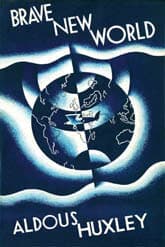Brave New World
Critique • Quotes
 First edition
First editionFirst publication
1932
Literature form
Novel
Genres
Satire, science fiction, dystopian
Writing language
English
Author's country
England
Length
Approx. 65,000 words
More than a catchphrase
I wonder if people who refer to Aldous Huxley's Brave New World as a cautionary tale—that is, those who aren't confusing it with George Orwell's Nineteen Eighty-Four—could actually spell out what it is cautioning against.
Even more to the point, tell me what alternative it is presenting to help humankind avoid the fate described in this novel?
Most books about a dystopia extrapolate from current trends to show what disastrous futures might come about if we don't change course. Orwell's more political novel is along these lines, along with hundreds of other science fiction stories.
But in Huxley's story, there is no disastrous future. Just the opposite. The factors that could cause social disasters have been eliminated. There is no poverty, little disease, no social unrest, no discontent—almost everyone seems happy to be living in a stable, friendly, prosperous society. They're all working at what they like doing and are healthy to pursue diverting recreation on their off time. Moreover, everyone has as much sex with as many partners as they like, without any repercussions.
So what's the problem?
This is what Huxley is asking. Because he does feel there's a problem. And we the readers feel, along with a small minority in Brave New World, there is a problem.
Arguments for ignorance
Some people might point to the lack of individuality and self-determination allowed the citizens of the World State. Or to their lack of self-expression through the arts. Or to the lack of scientific or any other kind of progress. The society has reached a comfortable state and then levelled off, prohibiting any further initiative or invention that would create instability.
Yet none of the book's millions of citizens, outside of our three protagonists, are concerned about any of this. This society is exactly how they want it. This point is what commentators—eager to make this famous novel a warning against their own favourite targets—tend to overlook. Despite showing the struggles of his dissenting characters through much of the novel, Huxley also presents crushingly sensible arguments in favour of the planned, cloned, brainwashed, ignorant, and culturally superficial society of the "new world".
Those few intellectuals who nonetheless don't like it are quite free to go off to an island to live with others of the same mind, or to join more primitive societies, while the majority of the world's populace persist in their merry, conditioned ways. Anyone who stays to fight is doomed to failure. There seems no alternative.
The reason Huxley is asking, "What's the problem?" is not because there isn't one. Rather he is provoking us to get past the easy cliché's about progress, freedom, happiness and such—and to consider more deeply what we mean by these, what we really want and need as human beings.
In the foreword to the 1946 and later editions, Huxley regrets not having put forward another alternative in the novel—one that would combine collective welfare, individual freedoms and spiritual pursuits, perhaps as spelled out in his later, less convincing novel, Island. But in Brave New World as it stands, he leaves the reader wondering, "Now what exactly is wrong here? Do I need to believe in something deeper than this?"
Canon fodder
Brave New World is not just a philosophical tract though. It's a novel. Although it's his most popular novel by far and is often called a classic of science fiction, Brave New World falls quite neatly into the Huxley literary canon, between Point Counter Point and Crome Yellow, as we see him moving from his earlier witty satires of the intelligentsia through a more profound questioning of the purposes of life.
We can also note that an aspect setting Brave New World apart from other works about dystopias is the psychological complexity of Huxley's characters. They may not be in the same league as the figures in his denser books but they're a cut above the one or two-dimensional types we often find in sci-fi novels. Huxley's wit is also intact in Brave New World and his writing style more innovative than usual for him.
I re-read this novel recently, expecting to find it somewhat dated. And it's true that Huxley's future society is missing some basic elements we would now expect, such as nuclear power and computers. The world is very mechanical, 1930s-style, rather than electronic or digital. It seems funny to imagine an advanced civilization would have elevator operators.
But all such novels of the future have their hits and misses.
Huxley's story and underlying message are as brave, new and provocative as ever.
— Eric
Critique • Quotes

